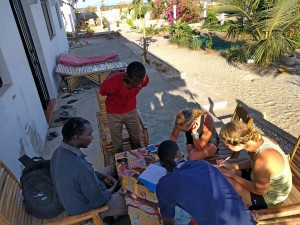
URI students learned about sustainable fisheries firsthand in Senegal during a J-Term study tour, with a little help from the CRC-led project USAID/COMFISH.

URI students learned about sustainable fisheries firsthand in Senegal during a J-Term study tour, with a little help from the CRC-led project USAID/COMFISH.

A delegation from the University of Cape Coast in Ghana will visit the University of Rhode Island next week as part of a $24 million sustainable fisheries project led by the Coastal Resources Center (CRC) at URI’s Graduate School of Oceanography.
The Ghana delegation will meet with URI President David M. Dooley Jan. 27 to expand on a memorandum of understanding that the universities signed in May 2015.
The agreement includes opportunities for cooperative research as well as faculty and student exchanges in Ghana and at URI. The West African university has a longstanding partnership with URI through CRC-led coastal management and food security projects in Ghana. Currently, CRC is leading the implementation of the five-year, $24 million United States Agency for International Development Ghana Sustainable Fisheries Management Project. The USAID grant is the largest ever awarded to URI.
Two fisheries experts from URI’s coastal center, Brian Crawford, in-country project director, and Najih Lazar, senior fisheries advisor, have been living in Ghana for the past year to help lead the project. Its goal is to revitalize marine fisheries stocks through responsible fishing practices and improved governance and ultimately benefit the more than 100,000 women and men involved in the Ghana fishing industry.
As part of this project, CRC and URI are working to build the research, educational and outreach capacity of the University of Cape Coast in coastal and fisheries management.
“Collaboration with the University of Cape Coast is an important element of the project, as one of the critical objectives of it is to build the skills and knowledge of Ghanaian stakeholders so they can continue the vital work of sustaining their fisheries sector and coastal communities long after this URI-led project has ended,” said Donald Robadue, sustainable fisheries project manager at CRC.
Leaders from both universities will discuss several aspects of the collaboration, with particular emphasis on student and faculty exchanges. These include developing an undergraduate program for URI students in Ghana during J Term, identifying areas of joint research among faculty, exploring opportunities for professional development and examining other areas of potential cooperation in marine fisheries, aquaculture and coastal resources.
The University of Cape Coast delegation also will visit URI’s Narragansett Bay Campus to meet with Graduate School of Oceanography Dean Bruce Corliss and talk with CRC colleagues about the details of the ongoing collaboration.
Recent activities of the SFMP are being reported on Ghana Web, a premier Ghanaian news website. The article reports that the SFMP partner organization Development Action Association (DAA) presented fish processing equipment to the women who exhibited outstanding leadership in advocacy for responsible fishing and safe post-harvest fish handling practices.
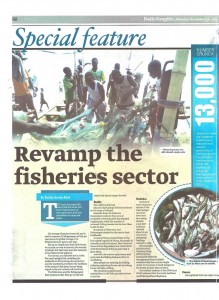 The Daily Graphic, considered the widest-selling newspaper in Ghana, ran a center spread special feature Nov. 30 on the crisis in the fisheries sector in Ghana. The story and photos, titled “Revamp the Fisheries Sector,” discussed CRC’s role in addressing the problem through the work of the USAID-funded Sustainable Fisheries Management Project (SFMP).
The Daily Graphic, considered the widest-selling newspaper in Ghana, ran a center spread special feature Nov. 30 on the crisis in the fisheries sector in Ghana. The story and photos, titled “Revamp the Fisheries Sector,” discussed CRC’s role in addressing the problem through the work of the USAID-funded Sustainable Fisheries Management Project (SFMP).
The article discussed key activities of SFMP and mentioned Brian Crawford, CRC’s in-country chief of party for the project.
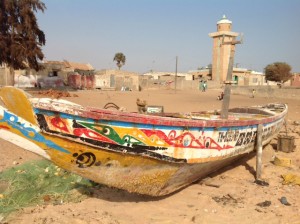
A URI Winter J-Term course on Sustainability and Climate Agility will be offered in Senegal, West Africa, Jan. 4-18, 2016.
J-Term courses take place during the winter break between semesters and include several study-abroad options. This program will allow students to explore mangrove estuaries, local townships and urban environments in Senegal on the coast of West Africa to better understand sustainable resource management and mitigation of habitat loss, ecosystem-based fisheries management and the challenges that climate change brings to those issues. CRC has several years of experience working in sustainable fisheries and climate change in Senegal through the USAID-funded Collaborative Management for a Sustainable Fisheries Future (COMFISH) project.
Click here to learn more or enroll in this one-of-a-kind learning experience in West Africa.
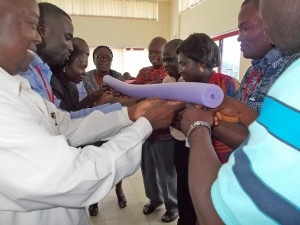
If a problem is systemic, then addressing it at identified critical points might be the best way to solve it. The URI Coastal Resources Center (CRC)-led Leadership for Fisheries Management program that recently concluded in Ghana, Africa, took that approach, both in and out of the classroom.
CRC, based at the Graduate School of Oceanography, and the College of the Environment and Life Sciences’ Fisheries Center have come together for years to offer such programs on campus and across the globe. This 10-day Ghana course differed a bit in that it brought together two dozen participants from all parts of the Ghanaian fisheries system (and one from Malawi)—from chief fishermen and women processors in villages, to boat owners, to government officials and representatives from non-governmental organizations.
“One of the strengths was that you had people from throughout the system, and you had everyone talking to each other, which is unique for Ghana,” said Glenn Ricci, a coastal manager at CRC and co-leader of the course along with Kathy Castro of the Fisheries Center.
In addition, the course was offered early in the tenure of the CRC-led USAID/Ghana Sustainable Fisheries Management Project (SFMP), which aims to help Ghana rebuild its collapsing small pelagic fishery, providing a broad window of opportunity for learning and implementation. “The primary difficulty is that even though there are strict rules and regulations in place, very few people are complying with them,” Castro said. SFMP and the fisheries leadership courses strive to change that.
The program, hosted at the University of Cape Coast (UCC), included faculty participants with the aim of building their capacity to offer these courses in the future. Next year, SFMP and UCC will co-facilitate and jointly implement the course.
Unlike some of the fisheries management programs CRC offers, which focus more on the technical aspects of fisheries, this course focused more on building leadership skills and empowering participants to understand that they can influence behavior throughout the fisheries system. The program covered how to influence people, how to understand your role in influencing positive behavior change, how to address conflict through finding common interest and understanding with those you might think you share no common ground.
With SFMP now underway, “there will be a great deal of follow on. We will offer programs like this twice a year. We want to create a group of 100 leaders throughout the fisheries system, strengthen their knowledge and ability to influence discussions from the local to the regional and national level. The courses are just a small part of a larger capacity development strategy to foster learning outside of the classroom,” Ricci said.
Ghana’s small pelagic fishery is crucial to its food security, and with SFMP, the timing is perfect for supporting a cadre of local people who can lead the country toward some tough decisions on how to reduce fishing effort in hopes of rebuilding fish stocks. For a renewed strategy to work, all stakeholders throughout the fishery system have to believe in the actions, despite low levels of trust and a history of ineffective management. Improved relations across the fishery system can make a new small pelagics fishery management plan more meaningful going forward.
In addition to classroom instruction in leadership, goalsetting, developing co-management plans and creating action plans, the group did a preliminary community analysis and then ran a stakeholder meeting in the fishing village of Elmina, Castro explained. This gave them hands-on experience to understand how local people see the way forward, what their visions are and to learn to listen more and talk less: a skill critical to being a successful leader. “It was very good for them to talk and listen to each other,” she said.
One message that emerged is that women fish processors have a good deal of power in the fisheries system. Many own boats and decide what fish to buy. “If organized, they could really influence the system,” Ricci said, much as the women in Cayar, Senegal, have as part of the CRC-led USAID/COMFISH project.
SFMP is there to guide and support Ghanaians’ progress toward a sustainable fishery, “but really it’s for them to do,” Ricci said. “The goal is to develop a viable network of informed, motivated people that understand the fisheries system and the power of vision driven changes.”
Throughout the tenure of SFMP, which concludes in 2019, CRC will return to Ghana with additional programs that build individual capacity that then strengthens the organization and ultimately the institutions and networks made up of those individuals and groups.
“It’s the follow-up, learning by doing method. It’s the CRC way,” Ricci said.
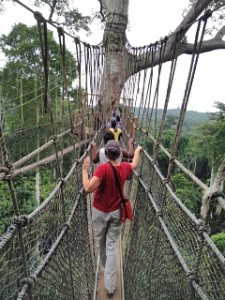
Daven Amin, a grad student studying statistics and computer science in the College of Arts and Sciences, spent two months in Ghana helping to create a survey of fishermen that will be administered by local CRC staff to measure the progress and success of the CRC-led Sustainable Fisheries Management Project. Daven lived with a local co-worker, spent long days in an office creating the survey, and was challenged in selecting a random sample of people to survey because there are no street addresses there. Electricity is also unreliable, so creating and training staff to administer the electronic survey using tablets was also a challenge. Because it’s a paperless survey, the data immediately go to a cloud where it can be analyzed in real time.
Learn how the project gave him a chance to put his skills to use in a unique place.
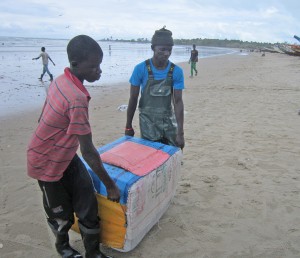
The Coastal Resources Center at the University of Rhode Island (URI) Graduate School of Oceanography, together with the National Sole Fishery Co-management Committee (NASCOM) in The Gambia, has launched a pilot project aimed at reducing post-harvest loss of sole at-sea. URI’s College for the Environment and Life Sciences fisheries center provided its expertise as well. The project is supported by a grant from the Rockefeller Foundation.
The project’s key objective is to determine if the use of ice and ice boxes aboard fishing vessels will reduce post-harvest economic losses at sea, improve the quality of sole harvested and deliver economic benefits throughout the supply chain of this export commodity. A traceability process also is being field-tested in parallel with the project. Both efforts aim to strengthen sustainability of the sole fishery, which is seeking Marine Stewardship Council certification.
From design to implementation, the project has involved multiple stakeholders, including fishermen, buyers, processors and exporters. Kaufland, a large retailer based in Europe that donated funds to NASCOM to support the move towards sustainability, also supports the project. NASCOM is used some of those funds to provide ice boxes to sole fishermen taking part in the study.
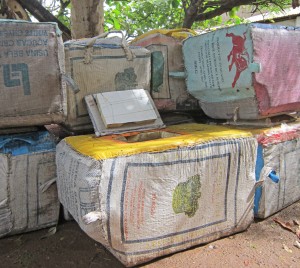
Learning from a six-week pilot implemented at two landing sites—Brufut and Gunjur —will inform changes in productivity and potentially could reveal added benefits across the value chain. The study will end in mid-September, but the efforts toward improving the fishery for all stakeholders will continue.
CRC will provide an update on the pilot project’s findings following its conclusion in September.
CRC staff members learned to scale, filet and prepare scup and sea robin at Hope & Main in Warren, R.I., on July 8. On the menu were fish tacos with scup,risotto with sea robin. It was a great afternoon with for the US program team at the fabulous Hope & Main commercial kitchen facility, which runs a nonprofit food business incubator program.
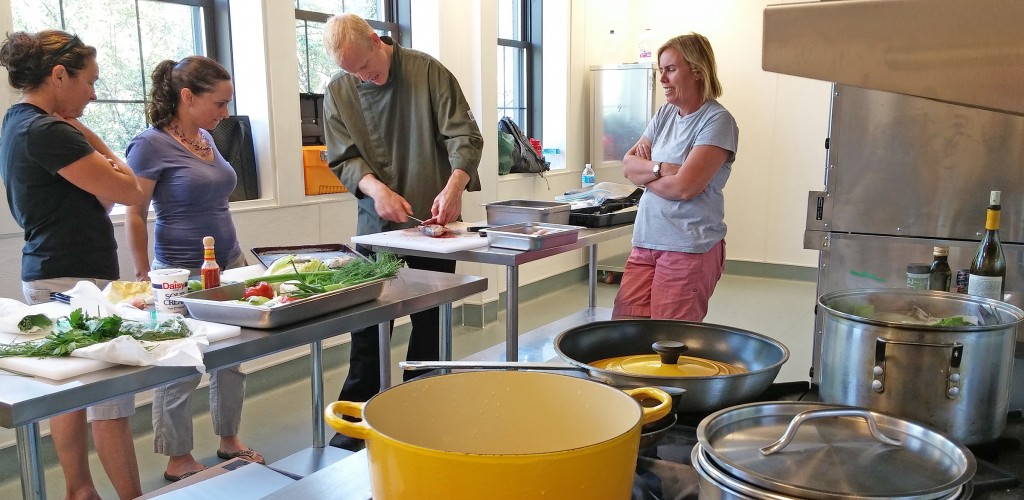
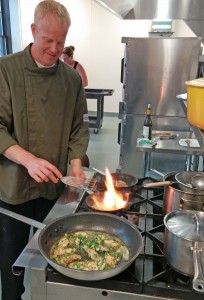
This Rockefeller Foundation blog, an oldie-but-goodie, showcases the Small-Scale Fisheries Innovation Summit, designed and facilitated by Stanford ChangeLabs and supported by the Rockefeller Foundation’s Oceans & Fisheries Initiative. Among the participants from eight countries was CRC’s then Interim Director Brian Crawford, now Chief of Party of USAID/Ghana Sustainable Fisheries Management Project.